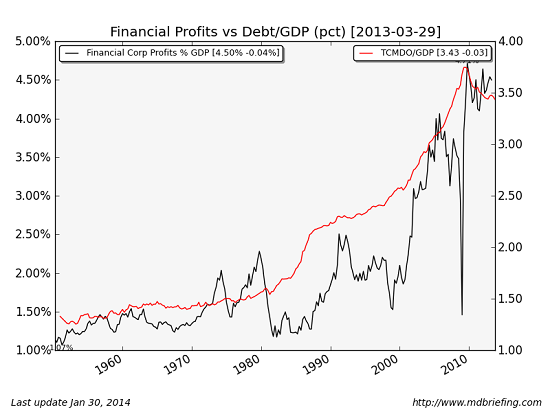What else can we do with the $1.25 trillion we’ll save by eliminating these obsolete financial middleman parasites? A lot.
Technology has leapfrogged the banking sector, rendering it as obsolete as buggy whips. So why are we devoting 9% of our economy to an obsolete parasite?Financial sector profits now total a staggering 4.5% of GDP (gross domestic product), while the expenses generated by financial churning account for another 4.5% of the economy.

chart courtesy of Market Daily Briefing
Software and existing non-Wall Street/too-big-to-fail institutions could replace the entire Wall Street/banking sector and drop costs to .5% of GDP, saving us 8+% of our GDP ($1.25 trillion) that is currently siphoned off by parasitic middlemen. The banking sector is Exhibit A in the Middleman-Skimming Economy (February 11, 2014).
The pull of habit and propaganda is so strong that most people haven’t even recognized that software and the Web can replace the entire financial/banking sector for a fraction of the cost of the current parasitic system, a system that (as we all know) has captured the regulatory and governance machinery of the central state, making a mockery of democracy.
The benefits of eliminating the financial/banking sector are immense and far-reaching.
What exactly do banks do? Banks perform these basic functions:
1. They hold depositors’ money.
2. They act as a clearing house for payments, transferring funds from payor to payee.
3. They issue loans on a fractional reserve basis, i.e. a few dollars in cash deposits supports $100 in loans.
4. They originate and trade derivatives, run high-speed trading desks, operate various money-laundering and embezzlement schemes, influence elected officials with lobbying and campaign contributions and subvert both free market capitalism and democracy at every turn.
This entire parasitic middleman sector could be replaced with automated digital clearing houses and crowdfunded or non-bank loans. Why do we need banks to pay bills online? We don’t; any clearing house could charge a small fee for the transaction.
Why do we need banks when loans can be crowdfunded? If we can invest money in start-ups via Kickstarter, Indiegogo, RocketHub, AngelList, etc., why can’t we own a piece of someone’s auto loan or home mortgage?
The web and software now enable the elimination of the entire middleman skimming operation of banking. Those with capital can invest that capital directly in loans that the investors choose. Risk is distributed throughout the system, and the process of verifying credit scores, income, valuations, assets, and so on–the building blocks of risk assessment and a market for debt and cash–can also be automated.
The entire notion that 100 savers put their money in a bank which then buys a mortgage with their savings and sells it as a security that supports a pyramid of derivatives is obsolete. Each saver can directly own (and sell on a transparent market) a piece of a mortgage, auto loan, business loan, etc. There is no need for a middleman banking sector at all–no skim, no concentration of risk, no opportunities for selling derivatives to unwary investors. All that goes away with the banking sector.




